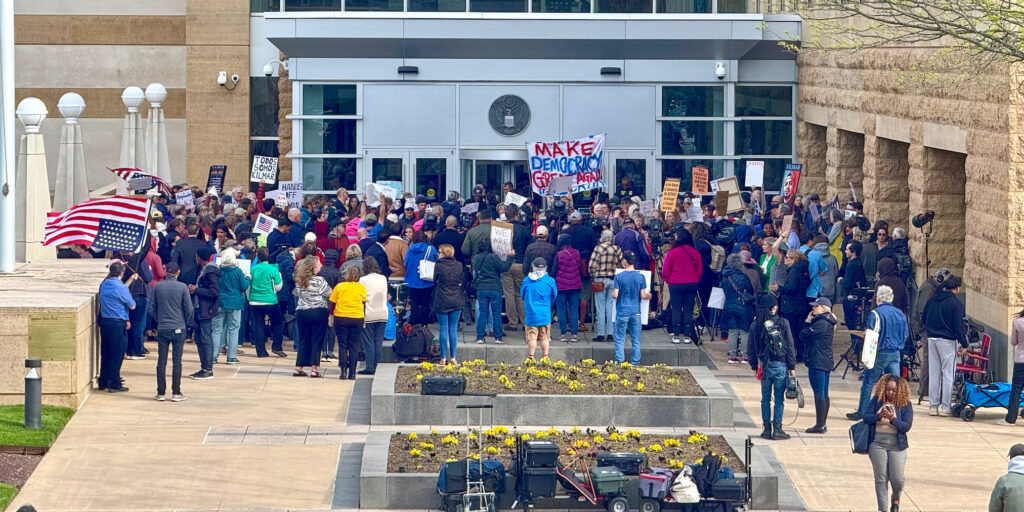On February 17, the Greenbelt City Council held a public hearing to allow residents a chance to weigh in with their concerns and suggestions for a forthcoming Collective Bargaining Agreement (CBA) with the Greenbelt Police Department, using the current CBA as a springboard to possible changes. The final CBA will be the result of review, approval and ratification by council and the Fraternal Order of Police (FOP) after representatives of both parties have negotiated. However, according to attorney Stephen Silvestri of Jackson Lewis, P.C., head of the city’s negotiating team, the public will be privy to the draft before that final vote, to give their final comments.
It was the consensus of the meeting that this collective bargaining process be as open and transparent as possible. Resident Bill Orleans asserted that this should be the case with any organized group of city employees. Silvestri said that the process has been awaiting this opportunity for public comment before entering into negotiations with the FOP, whose general counsel, Patrick McAndrew, was also present and eager to hear feedback.
Police Reform
Police reform was a major topic of the evening, especially as relates to police misconduct and how it should be handled and the use of body cameras. An essential component of this was the possible fate of the Law Enforcement’s Officers Bill of Rights (LEOBOR), within which many of these practices are codified and which applies to all sworn officers, including Greenbelt’s. Currently, LEOBOR is being debated in the state legislature with a possibility that it may be repealed. Yet, it was pointed out several times that even if that were to happen, there was a likelihood that Governor Larry Hogan would veto the bill and the statute would remain, at least until the next legislative session. If it is repealed, Silvestri said that any past LEOBOR policies would be negotiated by both the city and FOP as to whether they would remain in the CBA.
Most of the residents attending the hearing were strongly in favor of making any investigation of police misconduct a public concern and not a private, personnel issue within the Police Department itself. A related issue was the current practice of expunging records after three years, including past misconduct, something resident Cynthia Newcomer judged as wrong and not equitable, in that such special treatment is not accorded to other city employees. This sentiment was echoed by most of the participants. Resident Jeff Harrison pointed out that LEOBOR requires a public administrative trial board hearing for misconduct that includes two non-police members. He urged that any future hearings be advertised and that non-police members be trained accordingly, as provided by LEOBOR.
The constant use of body cameras was also unanimously approved, as it accorded protection to both the public and the police, and was essential in any investigation of police misconduct.
Article 27 of the CBA places the hiring of a police chief solely in the hands of the city manager. This was universally opposed, with the preferred method employing the council, FOP and city manager working together.
More Resident Views
Resident Claudia Jones felt that investigations of misconduct should not be public and that the expunging of records after three years should be retained.
Residents Ric Gordon and Katie Pugliese were keen to point out that while they wholeheartedly supported police reform, their stance was not the result of mistreatment at the hands of the Greenbelt Police. The aim was to put in place safeguards and policies that would hold officers accountable for misconduct in order to avoid a future tragedy, such as the police shooting of Michael Brown in 2014 in Ferguson, Mo.
Their opinion of the Greenbelt Police Department was high and respectful, especially for Chief Richard Bowers and Captain Tim White. Gordon extolled those officers who performed their jobs with justice and fairness and should be “celebrated.”
Resident Justin Baker noted that the Greenbelt Police Department is highly accredited with “no discernable record” of misconduct. He also felt that “defunding the police” often “backfires” and that perhaps a closer examination of the social causes of community unrest is the better strategy. He hoped that the new CBA would reflect that “police are here to help people.”
Resident Bob Rand was eager for more council support for the Greenbelt Fair and Just Justice Policing Act and the federal George Floyd Justice in Policing Act, both from 2020. He also felt that, as regards the deliberations of the CBA and the Fiscal Year 2022 budget, there was more of a need to incorporate “the guiding principle of police reform.”
For Gordon, who has been the victim of misconduct and profiling but not necessarily at the hands of Greenbelt officers, and resident LaWann Stribling, the experience of people of color is uniquely negative at times at the hands of law enforcement and requires addressing. Said Stribling, one must “understand the foundation” of this inequity, “recognize it and put it into law for it to be changed.”



